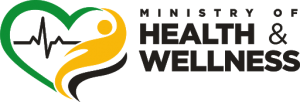The National HIV/STI Programme continues work in five sector ministries – Labour and Social Security, National Security, Local Government, Education, and Tourism.
The Ministry of Labour and Social Security (MLSS) has provided increased visibility and awareness of workplace principles advocated by the International Labour Organization (ILO). It has led the way in the development of a National HIV/AIDS Workplace Policy (2007) with support from the Jamaica Employers Federation (JEF) and the Jamaica Confederation of Trade Unions (JCTU). This ministry has also set the stage for HIV/AIDS workplace issues to be incorporated into the Occupational Health and Safety Act and thereby paving the way for all organizations to adopt HIV/AIDS workplace policies and implement programmes. The MLSS has also provided access to social welfare for People Living with HIV through its PATH Programme.
The Ministry of National Security is the access point to the incarcerated population. This ministry has already helped to provide non-traditional methods of dealing with risk reduction within prisons through cultural approaches and the involvement of inmates and correctional officers. As the estimated HIV prevalence within prisons (3%) is higher than the national HIV prevalence rate (1.7%), the partnership with the Security ministry is essential in reaching the staff of inmates with effective and meaningful programmes.
The Ministry of Education (MOE) reaches every school-age child absorbed into the formal education system. It is therefore a critical partner in ensuring the adoption of risk reduction behaviours and life skills. This sector has a crucial role in helping to dispel myths about HIV transmission and to establish zero tolerance for HIV/AIDS-related discrimination. The sector has been involved in the national response and has made some progress in institutionalising HIV/AIDS prevention within the sector. The Health and Family Life Education (HFLE) curriculum targeted to early childhood, primary and secondary levels for instance, has been revised to include sexuality and HIV/AIDS and piloted in teacher training colleges. Considerable progress has also been made in sensitising the sector to the National Policy for HIV/AIDS Management in Schools. A newly recruited cadre of health promotion officers who are expected to be absorbed into the ministry’s permanent staff has facilitated promotion of and adherence to this policy. Additionally, the sector has developed and reproduced educational materials to support the curriculum.
Despite these achievements however, the Education Sector has to be further supported to expand the response to the school-age population and their parents and guardians. This expansion should cover HIV/STI risk-reduction among the student population and the preparation of teachers, other school employees and parents to understand and support decisions and skills for both abstinence and condom-use. While the primary prevention option to the school population is delayed sex; condom-use skills need to be promoted in preparation for sexual activity and risk reduction behaviour. The sector is strategically positioned to reach and to impact the risk behaviours of a group of children and adolescents who are vulnerable to HIV and STIs. Also, relevant in the school context is the establishment of a non-discriminatory environment. This required structured and sustained interventions.
The Ministry of Tourism with the support from the Jamaica Hotel and Tourism Association (JHTA) has promoted the Tourism HIV/AIDS workplace policy within the sector and increased the presence of condom outlets within the sector. Such outlets have been placed within staff environments and not in hotel rooms and other points accessible to guests. The Tourism ministry is also well positioned to become a partner with the National HIV/STI Programme in reaching vulnerable populations within the sector. The tourism sector, like others need to incorporate HIV/AIDS into mainstream plans, where the mitigation of the impact of HIV/AIDS will be recognized as relevant to development goals and objectives within the sector.
